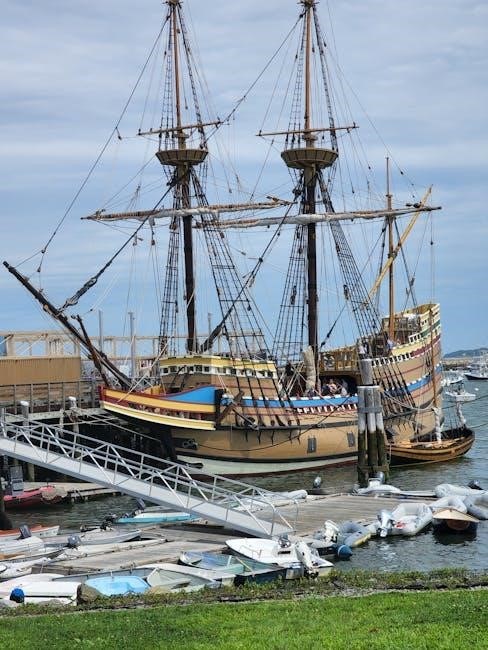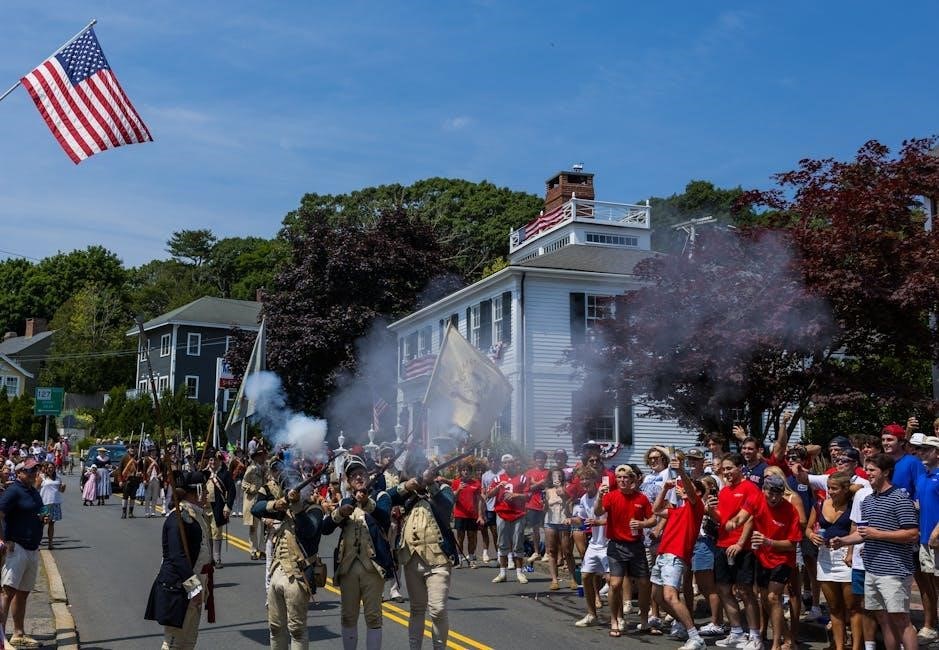john doane plymouth colony pdf
John Doane, a prominent figure in Plymouth Colony, arrived between 1628 and 1632, serving as deputy, assistant governor, and deacon, while raising a large family and leaving a lasting legacy in Cape Cod’s history․
1․1․ Overview of John Doane’s Life and Significance
John Doane, born circa 1590 in England, was a significant figure in Plymouth Colony, arriving between 1628 and 1632․ He served as deputy to the Old Colony Court, assistant governor in 1632/33, and deacon in Plymouth’s first church․ His leadership and contributions earned him respect, though his early life remains unclear․ He married Ann in England, raising at least five children, and later settled in Eastham, where he owned considerable land․ Doane’s legacy endures through his civic roles and family, shaping Cape Cod and New England history․ His life reflects colonial resilience and leadership, leaving a lasting impact on the region’s development․
1․2․ Historical Context of Plymouth Colony
Plymouth Colony, established in 1620 by Pilgrims aboard the Mayflower, was the second successful English settlement in North America․ The colony faced significant challenges, including harsh weather, limited resources, and interactions with Native American tribes like the Wampanoag․ The colony’s early governance, led by figures like William Bradford, relied on the Mayflower Compact, which established a framework for self-rule․ By the time John Doane arrived in the late 1620s, Plymouth had begun to stabilize, with growing trade and agriculture․ The colony’s strategic location on Cape Cod facilitated maritime activities, contributing to its economic growth․ Plymouth Colony played a pivotal role in the development of early American history, shaping governance, cultural practices, and relations with indigenous peoples․ Its legacy as a cornerstone of New England’s settlement endures, influencing the region’s identity and history․

Early Life and Arrival in Plymouth Colony
John Doane was born circa 1590 in England, married Ann before 1625, and arrived in Plymouth Colony between 1628 and 1632, aboard an unknown ship․
2․1․ Birth and Background in England
John Doane was born circa 1590 in England, with his early life remaining largely undocumented․ He married Ann, likely in England, before 1625, and they had at least five children․ While his exact background is unclear, his later prominence in Plymouth Colony suggests a modest but stable upbringing․ Doane’s marriage and family life in England laid the foundation for his future roles in the colony, though specific details about his education or profession remain unknown․ His transition to colonial life marked the beginning of a legacy that would shape Cape Cod’s history for generations․
2․2․ Migration to Plymouth Colony (1628-1632)
John Doane migrated to Plymouth Colony between 1628 and 1632, arriving on an unknown ship․ His exact departure from England and the vessel he traveled on remain unrecorded․ By the time of his arrival, Plymouth Colony was already established, having been founded in 1620 by the Mayflower passengers․ Doane’s migration marked the beginning of his significant contributions to the colony, where he would later serve in various governmental and religious roles․ His arrival coincided with a period of growth and stabilization in the colony, setting the stage for his eventual prominence․ While specific details of his journey are scarce, his presence in Plymouth by the early 1630s is well-documented, signaling the start of a life that would leave a lasting impact on the region․

2․3․ Settlement and Initial Contributions
Upon settling in Plymouth Colony, John Doane quickly established himself as a dedicated and active member of the community․ He initially resided in Plymouth, where he began contributing to the colony’s development․ Doane’s early efforts focused on supporting the colony’s infrastructure and governance, laying the groundwork for his future leadership roles․ His involvement in local affairs demonstrated his commitment to the colony’s prosperity․ Although the exact details of his initial landholdings are unclear, it is known that he later acquired significant property, including a homestead near Eastham․ His early contributions set the stage for his eventual positions of authority, showcasing his capabilities and earning the trust of his peers․ This period marked the beginning of a lifelong dedication to the colony’s growth and stability;

Government and Civic Roles in Plymouth Colony
John Doane served as deputy to the Old Colony Court, assistant governor, and a member of government committees, contributing to Plymouth Colony’s governance and stability․
3․1․ Deputy to the Old Colony Court
John Doane served as deputy to the Old Colony Court, playing a crucial role in Plymouth Colony’s legal and administrative affairs․ His duties included overseeing law enforcement, resolving disputes, and managing local governance․ As deputy, he worked closely with other officials to ensure the colony’s stability and adherence to laws․ This position underscored his leadership skills and commitment to the community․ Doane’s tenure as deputy was marked by fairness and dedication, earning him respect among the colonists․ His role in the court complemented his other civic responsibilities, such as serving as assistant governor․ Through his service, he significantly contributed to the colony’s orderly development and governance during its formative years․
3․2․ Service as Assistant Governor (1632/33)
John Doane served as Assistant Governor of Plymouth Colony during 1632/33, a period of significant growth and challenge․ In this role, he supported the governor in managing colonial affairs, ensuring laws were enforced, and maintaining order․ His leadership helped stabilize the colony, addressing issues like land distribution and trade․ Doane’s term as assistant governor showcased his administrative abilities and commitment to the colony’s prosperity․ His contributions during this time were pivotal, setting a foundation for future governance; This position, combined with his role as deputy, highlighted his versatility and dedication to public service, making him a key figure in shaping the colony’s early years․
3․3․ Membership in Government Committees
John Doane actively participated in various government committees within Plymouth Colony, contributing to its administrative and legislative processes․ These committees addressed critical issues such as land distribution, legal disputes, and trade agreements, ensuring the colony’s stability and growth․ Doane’s involvement in these committees highlights his commitment to public service and his ability to collaborate with other leaders; His role in these groups complemented his other civic duties, such as serving as deputy and assistant governor, demonstrating his versatility and dedication to the colony’s well-being․ Through his work in government committees, Doane played a pivotal role in shaping policies that benefited the colony and its inhabitants, leaving a lasting impact on its development and governance․
Personal and Family Life
John Doane married Ann in England around 1625 and had five children․ He served as a deacon in Plymouth Church and owned significant land in the colony․
4․1․ Marriage to Ann and Children
John Doane married Ann in England around 1625, with whom he had at least three sons and two daughters․ Their marriage laid the foundation for a prominent family in Plymouth Colony․ Ann’s background remains unclear, but her partnership with John supported his civic and religious roles․ The couple’s children grew influential, contributing to the colony’s growth․ John’s role as a deacon and leader likely shaped his family’s values, emphasizing faith and community service․ The Doane family’s legacy endured, with their descendants playing significant roles in Cape Cod’s history․ John’s long life allowed him to witness his children’s successes and the expansion of his family’s influence in Plymouth and later in Eastham, where he eventually settled․
4․2․ Land Ownership and Property in Plymouth
John Doane’s land ownership in Plymouth Colony is documented as significant, though early records do not specify the exact amount allocated to him during the initial settlement․ He acquired substantial property, including agricultural lands and homesteads, which supported his family and civic responsibilities․ His land holdings were crucial for his role as a colonist and leader, providing resources for sustenance and economic stability․ While the precise details of his property distribution remain unclear, his ownership reflected his prominence in the colony․ John’s land management likely aligned with Plymouth’s communal farming practices, contributing to the colony’s survival and growth․ His property also served as a foundation for his family’s legacy, enabling future generations to thrive in the region․
4․3․ Religious Role as Deacon in Plymouth Church
John Doane held a vital spiritual role as a deacon in the Plymouth Church, actively contributing to the religious life of the colony․ His position required leadership, moral integrity, and a deep commitment to the community’s faith․ As a deacon, he supported the church’s operations, facilitated religious services, and assisted in maintaining the congregation’s well-being․ His religious duties complemented his civic responsibilities, reinforcing his standing as a respected and influential figure in Plymouth․ John’s role as deacon underscored the importance of faith in shaping the colony’s social and moral framework․ His dedication to both religious and governmental roles exemplified the interconnectedness of church and state in early Plymouth Colony, solidifying his legacy as a pillar of the community․

Later Life and Legacy
John Doane spent his final years in Eastham, leaving a profound legacy in Plymouth Colony’s history․ His contributions to governance, religion, and community enduringly shaped Cape Cod and New England․
5․1․ Move to Eastham (Nauset) and Final Years
John Doane relocated to Eastham, then known as Nauset, around 1645, where he continued his civic and religious involvement․ He lived there until his death in 1685, aged 95, leaving a lasting impact on the region․
5․2․ Death and Burial in Cove Burying Ground
John Doane passed away in 1685/86 in Eastham, Plymouth Colony, at the remarkable age of 95 or 96․ He was buried in the Cove Burying Ground, a historic cemetery in Eastham, Massachusetts․ His grave serves as a testament to his enduring legacy in the region․ The exact date of his death is recorded as February 21, 1685, making him one of the longer-lived individuals of his time․ The Cove Burying Ground, where he rests, is a significant historical site, reflecting the early colonial history of Cape Cod; His burial location underscores his prominence and contributions to the community․ Historical records, including the History of Eastham, confirm his final resting place, ensuring his memory remains preserved for future generations․
5․3․ Enduring Impact on Cape Cod and New England
Deacon John Doane’s contributions to Cape Cod and New England remain profound and lasting․ His leadership in Plymouth Colony and later in Eastham shaped the region’s early development․ As a deacon, deputy, and assistant governor, he played a pivotal role in colonial governance, earning the trust of his community․ His homestead in Eastham, marked by historical signs, stands as a testament to his influence․ Doane’s legacy extends beyond politics; he was a family man and a religious leader, leaving a lasting imprint on the social fabric of Cape Cod․ Historical records and modern research highlight his significance, ensuring his contributions are remembered and celebrated by descendants and historians alike, solidifying his place in New England’s colonial history․

Historical Records and Documentation
Plymouth Colony records document John Doane’s significant role, with mentions in 85 entries from 1632/3 to 1645/6, supported by Eastham’s history and the Doane Family Association’s research․
6․1․ Plymouth Colony Records (1632/3-1645/6)
The Plymouth Colony records from 1632/3 to 1645/6 provide extensive documentation of John Doane’s role in the colony․ These records, totaling 85 entries, highlight his involvement in various governmental capacities, including his service as deputy to the Old Colony Court and assistant governor in 1632/33․ Notably, only one record refers to him as “John Doane,” while the rest use “John Done” or “Mr․ Done,” reflecting a common spelling variation of his surname․ These documents also detail his participation in key committees and his contributions to the colony’s administration․ The records conclude with his departure to Nauset (now Eastham) in 1645, marking the end of his active role in Plymouth’s government․ These historical accounts remain crucial for understanding Doane’s significance in early colonial governance and his transition to life in Eastham․
6․2․ The History of Eastham and Its References
The History of Eastham provides significant references to John Doane, detailing his life after moving to Nauset (now Eastham) around 1645․ The text describes how he acquired approximately 200 acres of land, with his homestead located near the town’s center․ Doane’s leadership continued in Eastham, where he played a pivotal role in establishing the community․ The history also notes his later years, including his death on February 21, 1685, at the age of 96, and his burial in the Cove Burying Ground․ These records emphasize Doane’s enduring influence on Cape Cod and New England, highlighting his transition from Plymouth Colony to becoming a founding figure in Eastham․ The references in The History of Eastham remain vital for tracing Doane’s post-Plymouth contributions and legacy․
6․3․ The Doane Family Association and Research
The Doane Family Association of America, Inc․, based in Vestal, New York, has been instrumental in preserving John Doane’s legacy through meticulous research and publications․ Historian Emma M․ Barrows compiled “The Doane Family” in 1975, providing extensive genealogical insights and connecting descendants across generations․ Steven W․ Morrison’s 2012 research, presented at the Doane Family Reunion in Plymouth, uncovered 85 Plymouth Colony records from 1632 to 1645, shedding light on John Doane’s contributions as a deputy, assistant governor, and deacon․ These efforts, along with the association’s archives, have significantly advanced the understanding of Doane’s role in Plymouth Colony and Eastham, highlighting his enduring impact on Cape Cod’s history and providing valuable resources for further study․

Modern Research and Publications
Modern research highlights Steven W․ Morrison’s 2012 study, uncovering 85 Plymouth Colony records, and the Doane Family Association’s comprehensive genealogy, preserving John Doane’s legacy for future generations․
7․1․ Steven W․ Morrison’s Research on John Done
Steven W․ Morrison conducted extensive research on John Done, focusing on original Plymouth Colony records․ His work, presented at the 2012 Doane Family Reunion, uncovered 85 records spanning from 1632/33 to 1645/46․ Morrison meticulously analyzed these documents to reconstruct John Done’s life, correcting historical inaccuracies and shedding light on his roles in Plymouth Colony․ His research highlighted Done’s prominence as a latecomer to the colony, serving in various government positions․ Morrison’s study provides a detailed account of Done’s activities, including his time as deputy, assistant governor, and committee member․ This work is invaluable for understanding Done’s contributions to Plymouth’s governance and his eventual move to Eastham․ Morrison’s findings have significantly enriched the historical narrative of John Done and his family’s legacy in early New England․
7․2․ The Doane Family: A Comprehensive Genealogy
The Doane Family: A Comprehensive Genealogy, compiled by the Doane Family Association of America, offers an extensive exploration of the Doane lineage․ This work traces the family’s history from John Doane’s arrival in Plymouth Colony through generations, detailing marriages, children, and descendants․ It includes historical records, land ownership, and contributions to colonial life, providing a rich tapestry of the family’s legacy․ The genealogy also connects the Doane family to broader historical events in New England, making it a vital resource for researchers and descendants․ This comprehensive study ensures the Doane family’s history is preserved and accessible for future generations, highlighting their enduring impact on Cape Cod and beyond․
7․3․ Presentation at the 2012 Doane Family Reunion
The 2012 Doane Family Reunion in Plymouth, Massachusetts, featured a presentation by Steven W․ Morrison, highlighting his research on John Doane․ Morrison’s work focused on 85 original Plymouth Colony records from 1632/33 to 1645, detailing John’s roles as deputy, assistant governor, and deacon․ The presentation emphasized John’s relocation to Eastham and his lasting influence on Cape Cod․ This event connected descendants, offering insights into their ancestral heritage and John’s pivotal role in shaping Plymouth Colony’s history․ The presentation underscored the significance of preserving family history through meticulous research and community engagement, fostering a deeper understanding of John Doane’s legacy among his modern-day descendants․

Additional Resources and References
Explore historical society publications, academic databases, and online archives for comprehensive insights into John Doane’s life and Plymouth Colony’s rich history․
8․1․ “The Doane Family” by the Doane Family Association
“The Doane Family” by the Doane Family Association is a comprehensive genealogical and historical account of John Doane and his descendants․ Compiled by the Doane Family Association of America, Inc․, this work provides detailed insights into John Doane’s life, including his migration to Plymouth Colony, his civic roles, and his family legacy․ It also explores his later years in Eastham and his enduring impact on Cape Cod․ The publication is a valuable resource for historians and genealogists, offering a well-researched narrative supported by primary sources․ The association’s efforts ensure that John Doane’s contributions to Plymouth Colony and New England history remain well-documented and accessible to future generations․ This work is a testament to the importance of preserving family histories and their connection to broader historical contexts․
8․2․ Historical Accounts of Plymouth Colony
Historical accounts of Plymouth Colony provide extensive insights into its governance, social structure, and key figures like John Doane․ Works such as “The History of Eastham” and Plymouth Colony records detail Doane’s contributions, land ownership, and political roles․ These accounts highlight his significance as a deputy, assistant governor, and deacon, showcasing his influence on the colony’s development․ Additionally, “The Doane Family” by the Doane Family Association and Steven W․ Morrison’s research offer detailed narratives of Doane’s life and legacy․ These historical records are essential for understanding Plymouth Colony’s evolution and the roles of its prominent figures, ensuring their stories remain preserved for future generations․
8․3․ Online Archives and Accessible Documents
Online archives and accessible documents provide valuable resources for studying John Doane and Plymouth Colony․ Websites like the Doane Family Association offer comprehensive genealogical records, including PDFs of historical documents․ Platforms such as Google Books and the Internet Archive host digitized versions of “The Doane Family” and other colonial histories․ These resources include detailed accounts of Doane’s life, his role in Plymouth Colony, and his later years in Eastham․ Additionally, Steven W․ Morrison’s research, presented at the 2012 Doane Family Reunion, is available online, offering insights into Doane’s contributions to colonial governance․ These accessible documents are essential for researchers and descendants, providing a wealth of information on John Doane’s legacy and his impact on Cape Cod and New England history․
